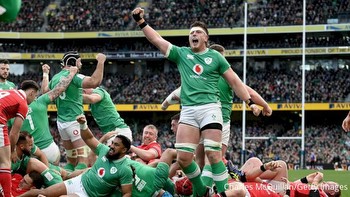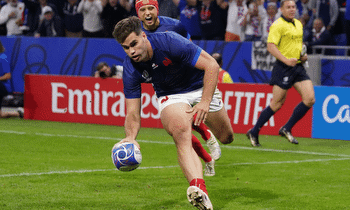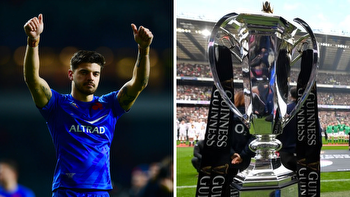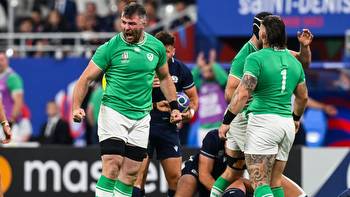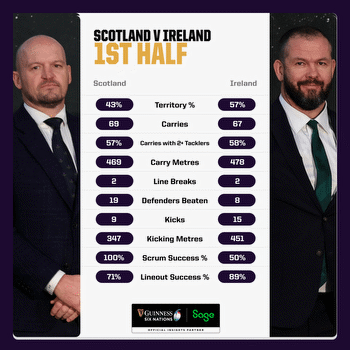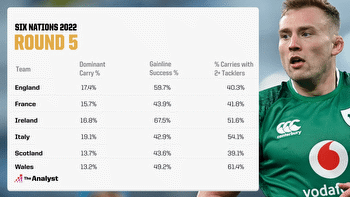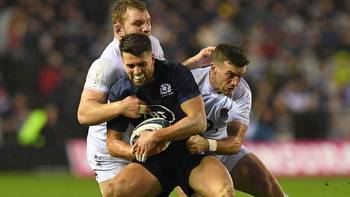Six Nations: Five things we learnt from the opening round of action

Following an exhilarating opening weekend of the 2024 Six Nations, here are five things we learnt after Ireland, England, and Scotland defeated France, Italy and Wales, respectively.
Ireland are the team to beat
At the start of the Six Nations, the bookies, fans, and pundits seemingly sang off the same hymn sheet, tipping Ireland and France as the frontrunners to lift the title in 2024.
Now that Andy Farrell’s side have overcome their first hurdle, arguably their most difficult one, they are the team to beat going forward and are well-placed to claim back-to-back titles.
Ireland may have caught France cold, and even if they did, they ruthlessly picked Les Bleus apart, and even when the bonus point was in the bag, they went for the jugular and scored another try to emphasise the win and deny France any chance of a losing bonus point.
The scrum faltered against France, but again, Les Bleus could be their most formidable challenge in that department in the competition while their lineout operated flawlessly on their throw and pressured France’s.
Jack Crowley, meanwhile, eased concerns over whether he can fill the boots of Johnny Sexton, and while it wasn’t a perfect performance in Marseille, it was a damn fine one, with his errors having no influence on the result and his brilliance steering the side to victory.
Mack Hansen’s absence was barely felt, with Calvin Nash thriving on the wing while Joe McCarthy made the most of his opportunity in the starting XV ahead of James Ryan as Ireland flexed their depth.
It will certainly take a tremendous effort for someone to knock Ireland off their perch this year.
France off to a slow start, again
In 2023, France was given a mighty scare by Italy in their opening match of the Six Nations, needing a bit of Matthieu Jalibert brilliance to see off the Azzurri, but they had no such luck this time around against Ireland.
Fabien Galthie’s charges looked lethargic at times and lacked cohesion as the Irish attack ripped through the Shaun Edwards-led defence with ruthless precision. It was an uncharacteristic performance from many players, including the likes of Jonathan Danty and Gael Fickou, with Ireland finding unprecedented success through the midfield.
Meanwhile, Maxime Lucu was overwhelmed at scrum-half in place of Antoine Dupont. His kicking game was well below par, and his overall performance was not helped by a back-tracking pack.
It’s not uncommon for French teams to start the Six Nations slow, but they will need a massive step up in round two as they head to Murrayfield looking to avoid three straight defeats for the first time under Galthie.
They definitely have the squad to get the job done and stay in contention in the race for the title, but failing to pick up a single point in their first game has put them squarely on the back foot.
England need time to adjust
Steve Borthwick is finally getting the opportunity to make long-term changes to his side and get the squad playing his style of rugby rather than one that would garner short-term results in the build-up and during the World Cup, and it shows.
There has been a lot of change in the squad and new additions to the coaching team which means that England need a bit of time to adjust, but we already saw some positives in their narrow win over Italy.
Ethan Roots was a massive plus as he dominated in the number six jumper that Courtney Lawes has vacated, while Fraser Dingwall and Tommy Freeman also impressed.
England did leak more tries than they scored against Italy, which highlights the teething issues when implementing a new defensive system. Felix Jones is laying the groundwork for a system similar to that used by the Springboks, and it will take some time to embed. We saw signs of it working effectively and other examples of it not working, but unfortunately, they will need to be patient and get comfortable with the setup.
Wales and Italy may be harder to beat than given credit for
Two sides that were largely written off before the tournament kicked off, and while Wales and Italy played their opening games at home, they showed that they would be no pushovers.
Wales found themselves in a 27-point hole early in the second half of their clash against Scotland, and much of that could be written off as a young Test stars being overwhelmed by the occasions. However, they showed real grit and determination to come within a score of winning the match.
Warren Gatland is breathing new energy and youth into the squad, and don’t be surprised if the young side knocks over one of the more fancied outfits in the competition.
As for the Azzurri, Gonzalo Quesada made a sturdy start to his tenure as Italy head coach, giving England a strong performance in Rome. The Italians fought right to the end and were rewarded with one league point, something that may well come in handy further into the competition.
While it is still a bit too soon to see everything that Quesada has changed, Italy certainly tweaked a few things and were less reliant on running every possession as they did for most of 2023. The injury to Seb Negri is a massive blow to the side but they do have a bit of depth in the back-row to cover and the cohesion of having mostly Benetton and Zebre players could pay further dividends with the an injection of some Ange Capuozzo pace bound to help as well.
Scotland need to learn to be ruthless
While Wales were brilliant in their fightback from 27 points down to lose by one, Scotland will rue the opportunity to stack up a massive scoreline in Cardiff.
Gregor Townsend’s side ended a 22-year wait for victory at the home of Welsh rugby. When the final whistle sounded, instead of jubilation, there was a collective sigh of relief, not for finally breaking their drought but because they hadn’t blown it at the end.
Finn Russell demanded better in the post-match press conference and was not pleased with the final scoreline, and rightly so. While a kickback from Wales in the latter stages was bound to come, the margin of their comeback made it too close for comfort. Scotland should have pulled away, and Russell knows it.
The one positive is that Gatland’s side exposed where Scotland is fragile, and Townsend and co. will be able to use that to better prepare for France, but at the same time, it did provide Les Bleus with a blueprint.
.jpg)

